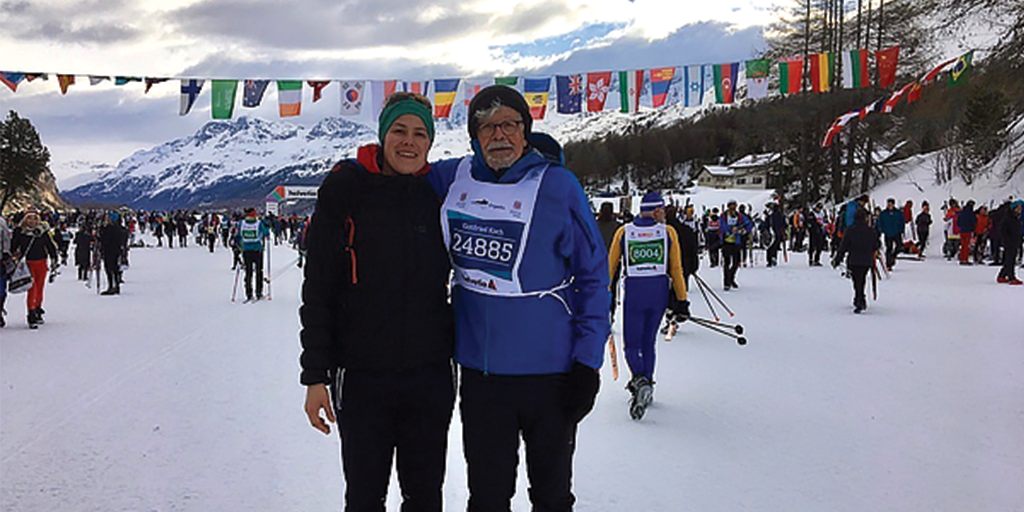Mobility – how well people walk – is an important marker of health. With advanced age, as well as disease and injury, mobility challenges often become prominent. The COVID-19 breakout and the subsequent lockdowns all over the world put severe restrictions on everyone’s mobility. However, as it turns out, the effect on people’s mobility has not only been negative. For Gottfried Koch (69), who has a previous history of heart disease, the lockdown, combined with watching our video (add hyperlink) was a small turning point in his life.
“We have a vacation home in Italy in the middle of the vineyards, a bit outside of a small town. A little outside of town is a cafe, the Café Stazione, in an old train station that is no longer used as such. In the mornings, I really need an espresso first thing, and I normally enjoy drinking one in coffeeshops as I like being among people. So typically, after waking up and brushing my teeth, I always get into my car and drive straight to the Café Stazione.”
During the COVID-19 lockdown, Gottfried’s daughter, Sarah Koch, was with her parents. She noticed that her father started to walk a lot again after a bit of an exercise-hiatus, because there was not much else to do during lockdown. “It was great to see my dad walking daily during the lockdown. Having a sport science background and working on Mobilise-D, I am aware of how important regular physical activity is for all aspects of health and well-being.”
As soon as the COVID-19 restrictions got relaxed, Sarah observed that her father was going back to pre-corona habits, with less physical activity. “So seeing how my dad lost his re-discovered walking routine when the COVID-19 restrictions were lifted made me sad and was a concern.” “He began to drive more again, and I reminded him that he should keep the walking and biking up as it’s important for healthy ageing.” Sarah then realized she could introduce Gottfried to our Mobilise-D video “Why mobility matters.”
“Recently, I received the advice from Sarah to watch your video. And I have to say that these individual statements completely convinced me. And I wanted to do more for my own mobility again.” Gottfried’s response to Sarah was inspiring. He told her he felt “Mobilise-D” and had left the car at home to walk to the coffee shop for the first espresso of the day. “It put a big smile on my face and made me very happy. It is great to see this direct effect of Mobilise-D on health behaviours in my family.”
After watching our video, Gottfried adapted his routines: “The first thing I do in the morning is make myself an espresso to wake up at home. Then I walk in a relaxed pace to the Café Stazione to get a second espresso to help the waking up process some more. That is about 5 000 steps each way, so 10 000 steps round trip. I purposefully take my time when walking in order to slow down a bit since the other activities of my day are typically fast paced. By the way, I also walk when it rains lightly.”
Gottfried says he achieves several goals through these measures: “I move, I slow down my day a bit by walking instead of driving, and I allow myself time to walk/run which allows me to pursue my thoughts.”
“[Your video] absolutely convinced me. I’m actually a person to whom exercise is very important. And I’ve always been athletic; however, I faced several health problems in the past. I ran several half and two full marathons with Sarah after I turned 50. That really boosted my self-confidence and showed me that one can still achieve goals. Unfortunately, I had to deal with further health problems recently. In particular the side effects of a medication made me very tired and slowed down «my entire engine». That is why I “forgot” and “forgot” how to move. Now, this medication is gone and I’m fine again. Of course, I can’t run marathons anymore. BUT: This is not a good enough reason not to walk at least 12,000 steps a day. And I love going for walks.”
“I’m a numbers guy and performance freak. I’ve used a wearable fitness tracker before when training for running events. Back then, I sometimes thought that I was swimming, cycling or running just for the statistics. My cell phone’s pedometer is a good tool to keep track of my physical activity currently. On the other hand, the cell phone tempts me to “play” while I am out for a walk, for example to make calls, write WhatsApp messages, etc. Currently, I am working on myself to find new (performance) goals again.”
Mobilise-D is ecstatic to see that our work has already had a direct impact in people’s lives! Stay tuned to meet more inspiring people like Gottfried in this new series of Real World stories!
Remember to FOLLOW us on Facebook, Twitter and LinkedIn.
Subscribe to our Newsletter.




